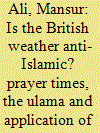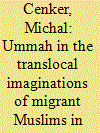| Srl | Item |
| 1 |
ID:
138240


|
|
|
|
|
| Summary/Abstract |
This paper concentrates on various present day constructions of supposed ‘Muslim ghettoes’ within Sydney, Australia. Several Australian anti-Muslim activists usually envision these ‘ghetto’ regions as overpopulated, contaminated slums overrun with ‘unAustralian’ criminals. These racist images surfaced in the recent controversy over a proposed Islamic school in Camden, located in Sydney’s far south-west. Between 2007 and 2009, opponents of the proposal organised anti-Muslim rallies, wrote protest letters to newspapers, distributed several protest leaflets, attracted the support of politicians and even placed severed pigs’ heads on the proposed site with an Australian flag (see Al-Natour 2010). These events of protest collectively make up the Camden Islamic school controversy. While arguing that Muslims have no place in Camden, protestors often contrasted Camden’s rural and white identity with Sydney’s urban and culturally diverse qualities. Opponents referred to Sydney’s ‘Muslim enclaves’ when they forecast Camden’s future with an Islamic school. These constructions of ‘Sydney’s slums’ formed a dystopian imaginary of Camden’s future, drawing on racist imaginative geographies of ‘Muslim ghettos’.
|
|
|
|
|
|
|
|
|
|
|
|
|
|
|
|
| 2 |
ID:
138243


|
|
|
|
|
| Summary/Abstract |
In the absence of clear-cut guidance from the primary sources of the shari’a, how do Muslim scholars derive a workable religious praxis in changing circumstances and which authorities do they invoke in the process? This article explores possible answers to these questions by conducting a detailed analysis of a debate between two groups of Deobandi scholars in Britain over establishing the correct time for the commencement of morning (Fajr) and the onset of fasting for Ramadan. I argue that besides the primary sources, these Deobandi scholars invoke alternate forms of extrascriptural authority such as the weight of precedence deriving from the akabir (elders) of the Deobandi tradition, as also their reliance on modern scientific knowledge. The article highlights the complex interplay of factors which determines the way that Muslims in Britain negotiate the practice of their religion in new sociocultural milieu and the way they attempt to incorporate these changes within the parameters of an established religious discourse.
|
|
|
|
|
|
|
|
|
|
|
|
|
|
|
|
| 3 |
ID:
138242


|
|
|
|
|
| Summary/Abstract |
This study draws from ethnographic data of a scarcely researched region of Central Europe to show how migrant Muslims in Slovakia confront everyday translocality by reifying a single community of Muslims. This symbolic community is articulated in the concept of the ummah. Muslims in Slovakia are mostly migrants, since formation of a larger “native” Muslim population was historically limited. It will be argued that ummah is an imagined community that translates the political and religious narratives of a global Muslim community into the local group of Muslims and, in such way, enables Muslims to transcend mutual ethnocultural, national and social heterogeneity. Furthermore, this study will show four different ways how the ummah as an imagined single community is reified: (1) ummah as a set of functional networks; (2) ummah as a symbol to interpret migrant experience; (3) ummah as a network of trust; and (4) ummah as a symbol in political narratives.
|
|
|
|
|
|
|
|
|
|
|
|
|
|
|
|